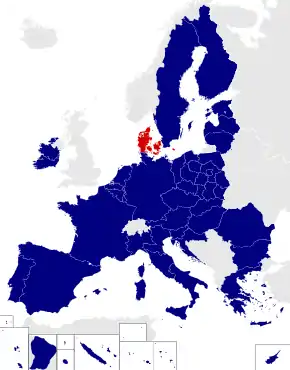Danish withdrawal from the European Union
Danish withdrawal from the European Union (colloquially Dexit[1][2] or Danexit,[3][4] a portmanteau of "Danish" and "exit") refers to the hypothesis that Denmark might leave the European Union (EU). Withdrawal is advocated by Danish Eurosceptics and opposed by Danish Pro-Europeanists: each of these groups spans the left–right political spectrum. The immediate objective of the Danish Eurosceptics is to have a referendum on their proposal. The proposal is supported by just one of the political parties represented in the Danish Parliament, which has less than 9% of the total seats.

Background
At the moment we are waiting for the results of the British negotiations with the EU; which relationship Britain will have with the EU. I am pretty sure that the result will be such that it could be interesting to have the Danish voters to vote on it as well.[5]
— Kenneth Kristensen Berth, August 2016. (Mr. Berth is a senior member of the eurosceptic Danish People's Party, DPP)
.jpg.webp)
Political positions


Representatives of the right-wing[6] to far-right[7] Danish People's Party (Dansk Folkeparti, DF), which has 16 (8.7%) of the 179 seats in the Danish Parliament, had already called for a Danish referendum on leaving the EU,[8] in the run-up to the British vote on June 23, 2016. In 2016,[8] DPP leader, Kristian Thulesen Dahl, said that he wanted a Referendum on self-determination, if only Brexit is a success.[8] The liberal party Venstre, Socialdemokraterne, Enhedslisten, Liberal Alliance, Alternativet, Det Radikale Venstre, Socialistisk Folkeparti, Det Konservative Folkeparti and the Kristendemokraterne Party are all against this proposal.[8]
In 2020, Morten Messerschmidt predicted that his country might leave the European Union within the next few years due to what he believed would be 'the success of Brexit'.[9]
History
Denmark has been a member of the EU since 1973 and has had a Eurosceptic majority for a long time;[5] nevertheless a majority support continued Danish membership of the EU.[5] Denmark has twice disrupted EU plans: in 1992, the Danes voted against ratification of the Treaty of Maastricht,[10] but approved it after the Danish Government renegotiated its terms to secure Danish opt-outs from some[8] of its provisions; in 2000 in another referendum,[8] Denmark decided by a small majority not to join the euro, but since then, the Danmarks Nationalbank has maintained a fixed exchange rate between the Danish Kroner and the euro.[11] Traditionally, Denmark has limited the extent that it will share its sovereignty with the rest of the European community.
Public opinion
| Dates conducted | Polling Firm | Remain | Leave | Undecided with Don't know | Lead | |
|---|---|---|---|---|---|---|
| 1 February 2020 | The United Kingdom left the EU. | |||||
| November 2019 | European Commission[12] | 63% Tend to trust | 26% Tend not to trust | 11% Don't know what to do | 37% | |
| November 2018 | European Commission[13] | 60% Tend to trust | 31% Tend not to trust | 9% Don't know what to do | 29% | |
| November 2017 | European Commission[14] | 52% Tend to trust | 37% Tend not to trust | 11% Don't know what to do | 15% | |
| November 2016 | European Commission[15] | 57% Total 'Optimistic' | 39% Total 'Pessimistic' | 4% Don't know | 18% | |
| 23 June 2016 | The United Kingdom votes to leave the EU. | |||||
| 11-12 April 2016 | Analyseenheden 4V | 30% Stay in the EU | 27% Follow Britain out of the EU | 34% Wait and see, and make a decision at a later point in time and 9% Don't know | 4% | |
| November 2015 | European Commission[17] | 65% Total 'Optimistic' | 30% Total 'Pessimistic' | 5% Don't know | 35% | |
| November 2014 | European Commission[18] | 73% Total 'Optimistic' | 25% Total 'Pessimistic' | 2% Don't know | 48% | |
| November 2013 | European Commission[19] | 75% Total 'Optimistic' | 22% Total 'Pessimistic' | 3% Don't know | 53% | |
See also
References
- Eriksen, Julie (23 June 2020). "Den våde drøm om Dexit bliver et mareridt: "Det er på tide, at vi danskere anerkender nogle fundamentale sandheder om vores lille, hyggelige land"". Politiken (in Danish). Retrieved 24 July 2020.
- "JV mener: Tak for klar DF-udmelding". JydskeVestkysten (in Danish). 7 June 2020. Retrieved 24 July 2020.
- "Danexit könnte dem Brexit folgen". Mein Geld (in German). 13 June 2016.
- "Danish media: Brexit won't lead to Danexit". uniavisen.dk. 23 June 2016.
- Miriam Arndts (1 August 2016). "Wie wahrscheinlich ist ein dänisches EU-Referendum?". DeutschlandfunkKultur.de (in German).
- Lodemel, Ivar (2014). Activation Or Workfare? Governance and Neo-Liberal Convergence. Oxford University Press. p. 64. ISBN 9780199773626.
- Boffey, Daniel (5 May 2019). "Danish far-right party calling for Muslim deportation to stand in election". The Guardian.
Rasmussen’s centre-right Venstre party has run a minority government since 2015 with the support of the far-right Danish People’s party along with the Liberal Alliance and the Conservative People’s party.
- Bodo Hering (25 June 2016). "Brexit: Sind Holland und Dänemark die nächsten?". Berlin Journal (in German).
- Andreas Karker (12 January 2020). "B.T. Morten Messerschmidt: Vi er meldt ud af EU inden 2030" (in Danish)..
- Helmut Steuer; Martina Meister; Boris Kálnoky; Jörg Winterbauer; Hans-Jörg Schmidt; Sarah Maria Brech (25 June 2016). "Diese Länder könnten die nächsten Exit-Kandidaten sein". Die Welt (in German).
- "DENMARK'S FIXED EXCHANGE RATE POLICY". Danmarks Nationalbank. Retrieved 31 January 2020.
- "Eurobarometer 2019" (PDF). European Commission.
- "Eurobarometer 2018". European Commission.
- "Eurobarometer 2017". European Commission.
- "Eurobarometer 2016". European Commission.
- a4v (12 April 2016). Danexit after Brexit? Summary
- "Eurobarometer 2015". European Commission.
- "Eurobarometer 2014". European Commission.
- "Eurobarometer 2013". European Commission.